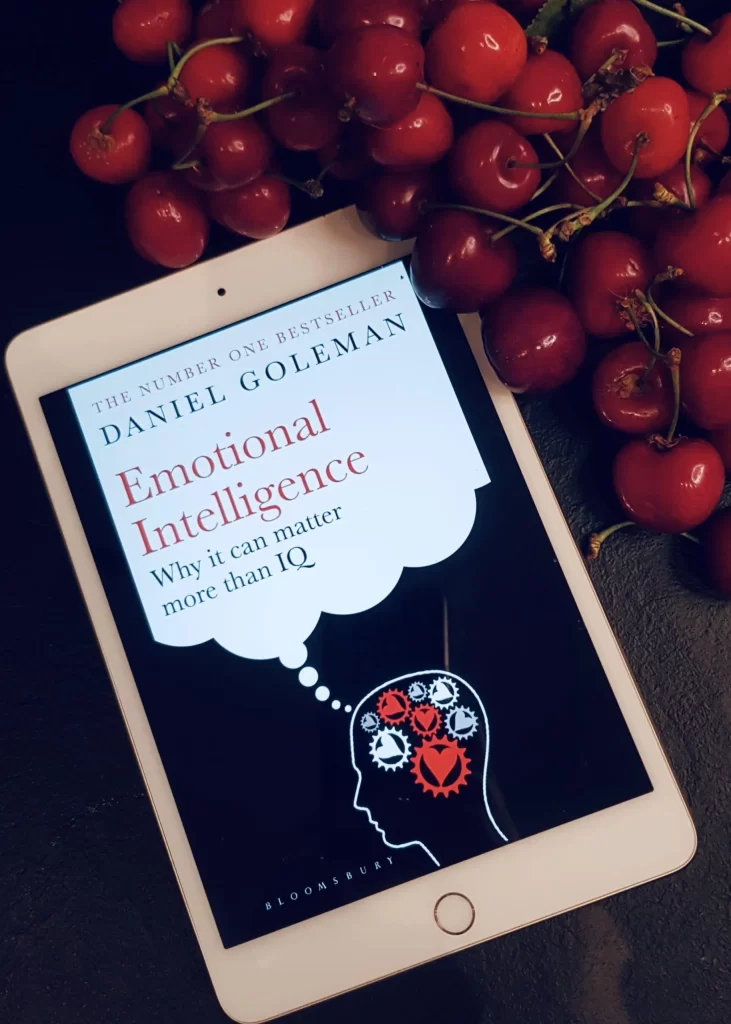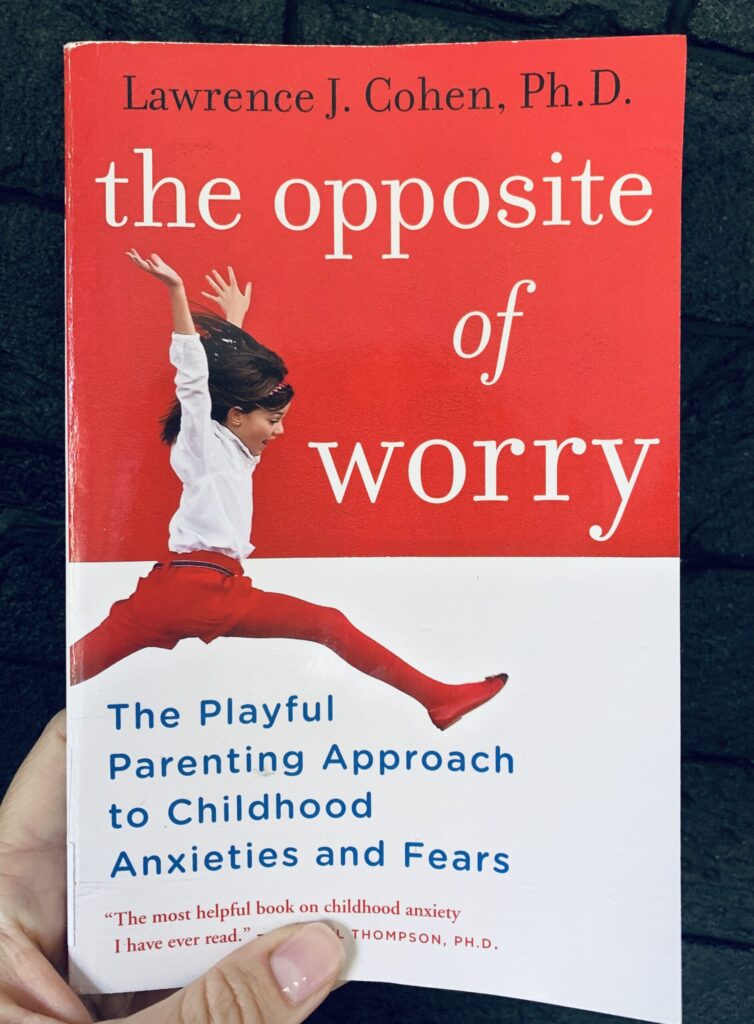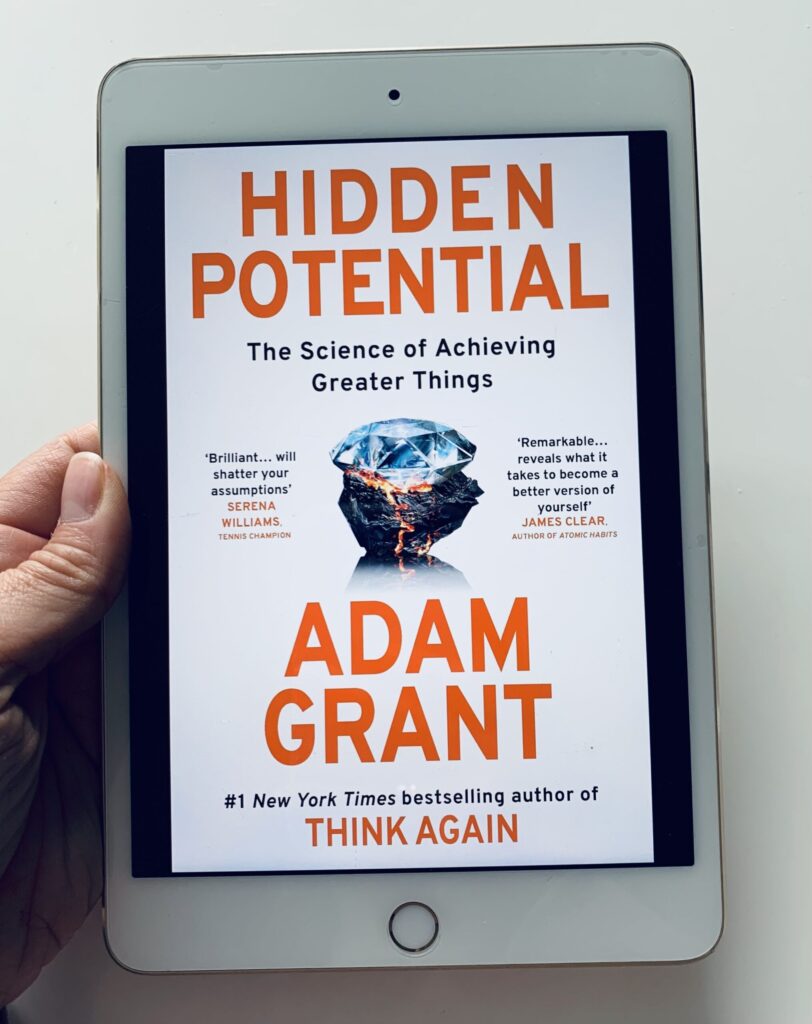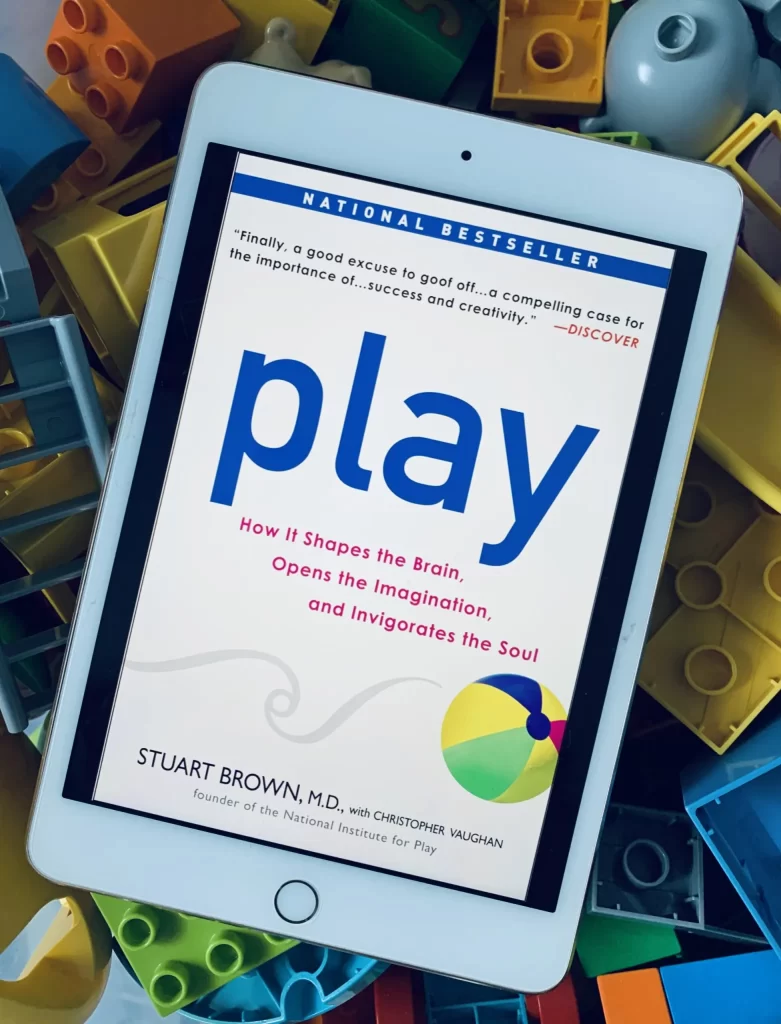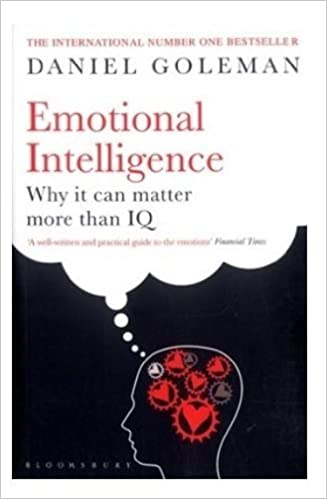 Emotional Intelligence
Emotional Intelligence
Why it can matter more than IQ
Daniel Goleman
Bloomsbury Publishing PLC; New edition (12 Sept. 1996)
About Daniel Goleman
Daniel Goleman is an internationally known psychologist who frequently lectures to professional groups, business audiences, and on college campuses. He is a former science journalist at The New York Times, a co-founder of the Collaborative for Academic, Social, and Emotional Learning and a co-director of the Consortium for Research on Emotional Intelligence in Organizations at Rutgers University.
Apart from his books on emotional intelligence, Goleman has written books on self-deception, creativity, transparency, meditation, social and emotional learning, ecoliteracy and the ecological crisis.
About The Book
“What can we change that will help our children fare better in life? What factors are at play, for example, when people of high IQ flounder and those of modest IQ do surprisingly well? I would argue that the difference quite often lies in the abilities called here emotional intelligence, which include self-control, zeal and persistence, and the ability to motivate oneself. And these skills, as we shall see, can be taught to children, giving them a better chance to use whatever intellectual potential the genetic lottery may have given.”
Emotional Intelligence is one of the most influential psychology books ever written. The book’s central message is that emotional intelligence may be the best predictor of success in life. Therefore, it would be wise to put effort not only into developing your hard skills, but also into working on your EQ.
As parents, we know that raising a child involves a whole range of emotions – both positive and negative. And that’s often exactly the thing, which makes us believe that parenting is so difficult. But the good news is that if we work on our emotional intelligence, it will bring a HUGE positive impact on our (and our children’s) wellbeing. EQ is a set of skills that we can learn and teach to kids from early childhood to give them a great start in life.
It’s a super important book for every parent or anyone who works with children. And by the way, it was rated as one of the top 25 business books of all time, so it’s a must-read for every leader, manager or business owner (or basically for everyone who works with people).
Let’s explore our favourite ideas.
Key insights
IQ vs EQ
“There are widespread exceptions to the rule that IQ predicts success—many (or more) exceptions than cases that fit the rule. At best, IQ contributes about 20 percent to the factors that determine life success, which leaves 80 percent to other forces…
Even Richard Herrnstein and Charles Murray, whose book The Bell Curve imputes a primary importance to IQ, acknowledge this; as they point out, ‘Perhaps a freshman with an SAT math score of 500 had better not have his heart set on being a mathematician, but if instead he wants to run his own business, become a U.S. Senator or make a million dollars, he should not put aside his dreams. … The link between test scores and those achievements is dwarfed by the totality of other characteristics that he brings to life.’
My concern is with a key set of these ‘other characteristics,’ emotional intelligence: abilities such as being able to motivate oneself and persist in the face of frustrations; to control impulse and delay gratification; to regulate one’s moods and keep distress from swamping the ability to think to empathize and to hope.”
So, who still believes that success, happiness, health and all the other wonderful things we aspire to in life depend on IQ? Goleman draws on research and highlights that there’s a rather weak correlation between IQ and flourishing.
What makes the difference? Our EQ:
- Knowing our emotions (self-awareness)
- Being able to manage emotions (handling feelings)
- Being able to motivate oneself (delay gratification and stifling impulsiveness)
- Recognizing emotions in others (empathy)
- Being able to handle relationships effectively
And guess what? These 5 domains of emotional intelligence actually represent a set of HABITS. That means that we can install these habits into our day to day life and gradually improve our EQ level.
Know Thyself – the power of self-awareness
“Self-awareness, in short, means being “aware of both our mood and our thoughts about that mood”….
Although there is a logical distinction between being aware of feelings and acting to change them, Mayer finds that for all practical purposes the two usually go hand-in-hand: to recognize a foul mood is to want to get out of it.”
Self-awareness is huge in psychology. If we ignore our feelings, thoughts, bodily sensations, we are just sleepwalking through our life. It’s hard to change our behaviour, to switch out of the autopilot if we are not aware of our feelings.
That means that when we are swamped by big emotions, we can still be self-reflective and choose how to act and how to get out of this feeling. We can make conscious choices on how to behave.
That actually reminds us of Dr Seligman and his work on Mindsight. In “The whole-brain child”, he also says that self-awareness is crucial for a happy and fulfilled life. He writes:
“When we become aware of the multitude of changing emotions and forces at work around us and within us, we can acknowledge them and even embrace them as parts of ourselves—but we don’t have to allow them to bully us or define us. We can shift our focus to other rim points on the wheel of awareness, so that we are no longer victims of forces seemingly beyond our control, but active participants in the process of deciding and affecting how we think and feel.”
Absolutely love this. Check out our notes on “The whole-brain child” to get more ideas on how you can help your child develop mindsight and self-awareness.
Take a moment and think about how and if you are aware of your emotions?
“If I bring 5 percent more awareness to my emotions – “ (sentence-completion Nathaniel Branden’s style :))
The art of soothing ourselves
“Managing our emotions is something of a full-time job: much of what we do—especially in our free time—is an attempt to manage mood. Everything from reading a novel or watching television to the activities and companions we choose can be a way to make ourselves feel better. The art of soothing ourselves is a fundamental life skill.”
Negative emotions may cause stress, anxiety and, in the long run, depression. And in turn, it may affect our health, our cognitive abilities and our relationships. In a nutshell, distressing emotions are toxic for our wellbeing, and it’s super important to learn how to manage them.
The art of self-regulation is crucial for all kinds of relationships. We have a lot of stress in our lives, and sometimes, small things may trigger anger and frustration. So we start acting impulsively (e.g. yelling at our child, nagging our partner, etc.), and it’s ruining our relationships. How to apply first-aid when you feel like you are losing your cool? Take a deep breath, take a break and get your amygdala under control. Check out our notes on “The whole-brain child” for more tips from Dr Seligman and Dr Pyne-Bryson.
By the way, do you know when is the best time to start teaching your child how to soothe themselves? It’s from birth:
“The infant who through countless episodes of being soothed is helped along in learning how to calm down, the speculation goes, will have stronger connections in this circuit for controlling distress, and so throughout life will be better at soothing himself when upset.”
Many techniques for managing distressing emotions described by Goleman in this book resonate with the happiness strategies suggested by Sonja Lyubomirsky in “The How of Happiness” (check out the notes and our article on how to increase your happiness level). For example:
- Daily exercise
- Avoid overthinking and rumination
- Engineering a small triumph or easy success
- Helping others in need (acts of kindness)
- Nurture relationships
Questions for you – What are your top 3 strategies for soothing yourself? What makes you feel better?
Optimism and Hope – the science of self-motivation
“From the perspective of emotional intelligence, having hope means that one will not give in to overwhelming anxiety, a defeatist attitude, or depression in the face of difficult challenges or setbacks. Indeed, people who are hopeful evidence less depression than others as they manoeuver through life in pursuit of their goals, are less anxious in general, and have fewer emotional distresses.”
Hope is huge in positive psychology. It’s more than a belief that the next day will be brighter. As one of the key hope researchers, Snyder defines it: “believing you have both the will and the way to accomplish your goals, whatever they may be.”
People with high levels of hope can motivate themselves, feel resourceful enough to find ways to accomplish their goals, don’t give up in when facing a challenge, looking for different ways to get to their objectives or to switch goals if one becomes impossible and have the sense to break down a formidable task into smaller, manageable pieces.
Goleman also draws on Martin Seligman‘s research and highlights that there is another big motivator – optimism:
“Optimism, like hope, means having a strong expectation that, in general, things will turn out all right in life, despite setbacks and frustrations. From the standpoint of emotional intelligence, optimism is an attitude that buffers people against falling into apathy, hopelessness, or depression in the face of tough going.”
An optimistic mindset is critical for resilience and the ability to overcome failures. That’s the basis of Grit and the Growth Mindset.
So if you are struggling with motivating your child, your team or even yourself, you can start with cultivating hope and optimism ☺
For example, use your journal to do the “Best Possible Self” exercise:
Set a timer for 10 minutes, and during this time, think about your best possible future self and write it down on paper. Imagine your life the way you always imagined it would be. Imagine that you have performed to the best of your abilities and achieved all the things you wanted to in life. While writing, do not worry about grammar or punctuation. Just focus on writing all your thoughts and emotions in an expressive way.
Empathy and attunement
“Empathy builds on self-awareness; the more open we are to our own emotions, the more skilled we will be in reading feelings.”
Empathy is probably one of the first things that come to our minds when we think of emotional intelligence. Our ability to know how others feel comes into play in pretty much all areas of our lives. Especially in parenting. Goleman brings a few points here.
Firstly, children who could read feelings nonverbally were amongst the most popular in their schools and the most emotionally stable. That’s a good reason to teach your child some empathy.
Secondly, we start developing empathy in infancy. Have you ever seen how a baby starts crying when another child gets upset? Yep, that’s it.
Thirdly, we can teach our children to be more sensitive to other people’s feelings. How? For example, through discipline:
“Children, they found, were more empathic when the discipline included calling strong attention to the distress their misbehavior caused someone else: “Look how sad you’ve made her feel” instead of “That was naughty.”
So next time when your toddler upsets a friend, use it as an opportunity to practice empathy ☺
Empathy goes hand in hand with attunement – when we let our child know that his emotions are met with empathy, accepted and reciprocated. This is super important for our child’s emotional life.
And when parents are misattuned to their child, things get messy:
“Prolonged absence of attunement between parent and child takes a tremendous emotional toll on the child. When a parent consistently fails to show any empathy with a particular range of emotion in the child—joys, tears, needing to cuddle—the child begins to avoid expressing, and perhaps even feeling, those same emotions. In this way, presumably, entire ranges of emotion can begin to be obliterated from the repertoire for intimate relations, especially if through childhood those feelings continue to be covertly or overtly discouraged.”
So it’s important to pay attention to a child’s emotions – both positive and distressing. But first of all, we should work on our empathy to be able to attune to our children.
It all starts with parents
“Family life is our first school for emotional learning; in this intimate cauldron we learn how to feel about ourselves and how others will react to our feelings; how to think about these feelings and what choices we have in reacting; how to read and express hopes and fears. This emotional schooling operates not just through the things that parents say and do directly to children, but also in the models they offer for handling their own feelings and those that pass between husband and wife.”
Love it. Children always imitate their parents. Often they become their mirror. So if we want our children to develop a high level of Emotional Intelligence, we should START WITH OURSELVES. Little eyes are always watching.
And the first three or four years of a child’s life are CRUCIAL for brain development and emotional development. Goleman makes a powerful statement:
“There are very different emotional habits instilled by parents whose attunement means an infant’s emotional needs are acknowledged and met or whose discipline includes empathy, on the one hand, or self-absorbed parents who ignore a child’s distress or who discipline capriciously by yelling and hitting. Much psychotherapy is, in a sense, a remedial tutorial for what was skewed or missed completely earlier in life. But why not do what we can to prevent that need, by giving children the nurturing and guidance that cultivates the essential emotional skills in the first place?”
YES! We can’t agree more!!! We are raising adults. It’s always helpful to ask yourself two questions when you become a parent – (1) what type of person do I want my child to become? (2) What type of parent do I need to become to raise an adult like that?
And it makes more sense to work on preventing issues than fixing them later. Cheers to positive psychology!
Here is also an important thought – emotional intelligence is a SKILL. And it is a very important life skill. That means that if parents are not in a place to teach their kids some EQ basics, there should be a way to teach it at school. However, the issue is that there are just a few educators who recognize this need.
“Learning doesn’t take place in isolation from kids’ feelings. Being emotionally literate is as important for learning as instruction in math and reading.”
In the book, Goleman argues that if schools address emotional literacy, this will help tackle many issues such as bullying, aggression, drug and alcohol abuse, child depression, drop-outs, sexual abuse and teenage pregnancy.
Goleman also shares the inspiring success stories of the American schools, where socio-emotional learning was in place – check out the book for more.
Action steps for you:
- Practice self-awareness (e.g. for 3 days notice how you feel and name these emotions).
- Write down 3 strategies for coping with negative emotions. Take a moment to discuss the soothing strategies with your child as well.
- Nurture an optimistic outlook in your family
Quotes from the book:






